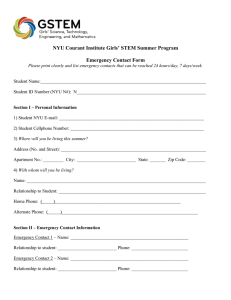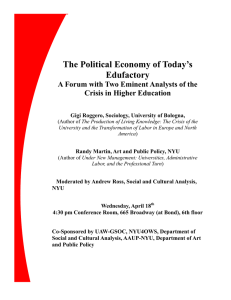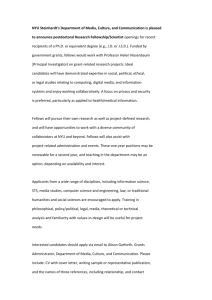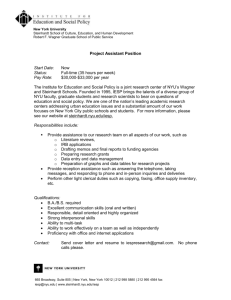HSED-GE 2070 Public Problems: Education and Social Policy/Teacher Education
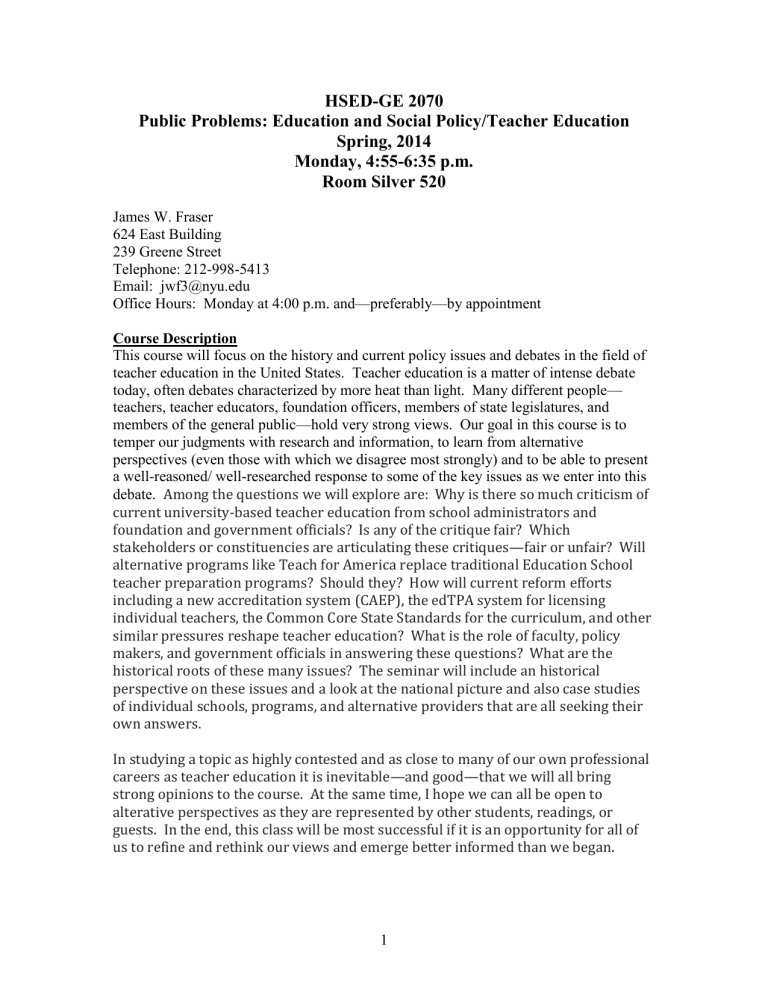
HSED-GE 2070
Public Problems: Education and Social Policy/Teacher Education
Spring, 2014
Monday, 4:55-6:35 p.m.
Room Silver 520
James W. Fraser
624 East Building
239 Greene Street
Telephone: 212-998-5413
Email: jwf3@nyu.edu
Office Hours: Monday at 4:00 p.m. and—preferably—by appointment
Course Description
This course will focus on the history and current policy issues and debates in the field of teacher education in the United States. Teacher education is a matter of intense debate today, often debates characterized by more heat than light. Many different people— teachers, teacher educators, foundation officers, members of state legislatures, and members of the general public—hold very strong views. Our goal in this course is to temper our judgments with research and information, to learn from alternative perspectives (even those with which we disagree most strongly) and to be able to present a well-reasoned/ well-researched response to some of the key issues as we enter into this debate. Among the questions we will explore are: Why is there so much criticism of current university-based teacher education from school administrators and foundation and government officials? Is any of the critique fair? Which stakeholders or constituencies are articulating these critiques—fair or unfair? Will alternative programs like Teach for America replace traditional Education School teacher preparation programs? Should they? How will current reform efforts including a new accreditation system (CAEP), the edTPA system for licensing individual teachers, the Common Core State Standards for the curriculum, and other similar pressures reshape teacher education? What is the role of faculty, policy makers, and government officials in answering these questions? What are the historical roots of these many issues? The seminar will include an historical perspective on these issues and a look at the national picture and also case studies of individual schools, programs, and alternative providers that are all seeking their own answers.
In studying a topic as highly contested and as close to many of our own professional careers as teacher education it is inevitable—and good—that we will all bring strong opinions to the course. At the same time, I hope we can all be open to alterative perspectives as they are represented by other students, readings, or guests. In the end, this class will be most successful if it is an opportunity for all of us to refine and rethink our views and emerge better informed than we began.
1
Steinhardt Announcements
An important message from the Dean regarding your rights:
Any student attending NYU who needs an accommodation due to chronic, psychological, visual, mobility and/or learning disability, or is Deaf of Hard of Hearing should register with the Moses Center for Students with Disabilities at 212.998.4980, 240 Greene Street, www.nyu.edu/csd
.
Important Additional Policies that all students need to be aware of:
NYU Steinhardt’s Grading Policies http://steinhardt.nyu.edu/registration/standards#grading_policies
Statement on Academic Integrity: http://steinhardt.nyu.edu/policies/academic_integrity
Readings
There are five primary texts needed for this course. All are available at the NYU
Bookstore. Additional reading assignments will be handed out in class or online.
Kenneth M. Zeichner, Teacher Education and the Struggle for Social Justice
(New York: Routledge, 2009).
Linda Darling-Hammond and Joan Baratz-Snowden, A Good Teacher in Every
Classroom (San Francisco: Jossey-Bass, 2005)
Frederick M. Hess, Andrew J. Rotherham, and Kate Walsh, A Qualified Teacher in Every Classroom? Appraising Old Answers and New Ideas (Cambridge:
Harvard Education Press,
Pam Grossman and Susanna Loeb, editors, Taking Stock: An Examination of
Alternative Certification (Cambridge: Harvard Education Press, 2008)
James W. Fraser, Preparing America’s Teachers: A History ( New York:
Teachers College Press, 2007)
2
Course Schedule
Class meets on Mondays 4:55-6:35
January 27: Introductions and Overview: A Look at the Current Status and
Debates in Teacher Education
What interests do each of us bring to this course?
What do each of us (students and instructor) hope to accomplish this semester?
Review (and revision) of the course outline and semester assignments
Who was being educated? By whom? For what purposes?
Assignment for January 27—in class read Bill Keller, “An Industry of Mediocrity,” New
York Times , October 20, 2013 and James W. Fraser, “A Tale of Two Futures,” Kappan,
October, 2010 (both articles will be handed out in class).
February 3—Understanding the current reform climate and debates in teacher education
We will focus on Zeichner’s efforts to structure the many sided debates about teacher preparation that are currently taking place in the United States and then turn to two of the major players in these debates, NCTQ which is highly critical of most university-based teacher preparation programs and AACTE which represents these same programs in its membership and seeks to both elevate and defend them.
Assignment for February 3—Read Zeichner, Teacher Education and the Struggle for
Social Justice , Preface and Chapter 1; and
NCTQ, Teacher Prep Review: Review of the nation’s teaching preparation programs http://www.nctq.org/dmsView/Teacher_Prep_Review_2013_Report
AACTE, The Changing Teacher Preparation Profession http://aacte.org/news-room/announcements/aacte-releases-data-report-onstate-of-teacher-preparation.html
February 10—The Professionalizing Agenda
Linda Darling-Hammond has emerged as perhaps the leading advocate for better and stronger university-based programs and a major critic of alternative routes into teaching. For Darling-Hammond and many who agree with her, the key to improved teacher preparation is dramatically higher and tougher standards for programs that prepare teachers and an elimination of alternative routes and lowquality university programs.
Assignment for February 10—Read Linda Darling-Hammond and Joan Baratz-Snowden,
A Good Teacher in Every Classroom
First Op Ed on the professionalizing agenda due in class with revised copy submitted electronically by February 12.
February 17—President’s Day, No Class
3
February 24—The Deregulation Agenda
While Darling-Hammond is a leader among those who call for tougher, higher standards for teacher education programs, Frederick (Rick) Hess is a leader among those who believe that in the absence of compelling research school districts should be given maximum freedom in determining who should teach in their classrooms without attention to the kind of preparation they have or have not received.
Assignment for February 24—Read Hess, Rotherhant, and Walsh, A Qualified Teacher in
Every Classroom?
and
Grossman and Loeb, Taking Stock: An Examination of Alternative Certification
Second Op Ed on the deregulating agenda due in class with revised copy submitted electronically by February 26.
March 3—The Social Justice Agenda
While proponents of different forms of teacher preparation debate, other educators ask different questions including: What is the purpose of education and should that purpose shape teacher education?
Assignment for March 3—Read Zeichner, Teacher Education and the Struggle for Social
Justice , chapters 2, 4, 5, 6, and 9 (each chapter is a separate essay)
Third Op Ed on the social justice agenda due in class with revised copy submitted electronically by March 5.
March 10—How Did We Get Here? A Look at the History of Teacher Education
While the debates continue, too few educators ask the question of how today’s different teacher education programs have developed and how we might learn from historical problems and precedents. In this session we will look at how teachers have been prepared in the United States over the last 200 years including especially the relatively recent emergence of university-based teacher preparation as a national norm.
Assignment for March 10—Read Fraser, Preparing America’s Teachers.
March 17—Spring Break, No Class
March 24—Time for planning groups .
No regular class meeting. Please schedule time during the week to meet with instructor to review plans for class presentation and research paper.
Assignment: Topics and planning groups should be selected by the end of class on
March 10. Spring break should be used for research for the in-class presentation on
March 31 or April 7 and for the final paper due May 16.
4
March 31—Class Presentation—Case Studies of Professionalized Teacher
Preparation Programs —see assignments at end of syllabus
April 7—Class Presentation—Case Studies of Deregulation Based Programs —see assignments at end of syllabus
April 14—What About Accreditation?—Guest speaker Mary Brabeck, Chair of the
Board, Council for the Accreditation of Educator Preparation (CAEP).
April 21—Is a Different Kind of Education School Possible—A Look at Relay
Graduate School of Education—Guest speaker Norman Atkins, President, Relay
Graduate School of Education
April 28—Why do we care? What are the stakes in these debates?
Assignment for April 28—Read the following three essays:
Arthur Levine, Educating school teachers: The education schools project, 2006 www.edschools.org/pdf/educatingteachers
Richard Ingersoll, Lisa Merrill, and Henry May, “What Are the Effects of Teacher
Education and Preparation On Beginning Math and Science Teacher Attrition?” http://www.cpre.org/sites/default/files/meetingpaper/1479_richard.pdf
The Education Trust, “Preparing and Advancing Teachers and School Leaders: A New
Approach for Federal Policy” http://www.edtrust.org/sites/edtrust.org/files/publications/files/Preparing_and
_Advancing_0.pdf
May 5—Where Do We Go From Here?—Skype meeting with Kenneth Zeichner,
University of Washington
Assignment for May 5—Read Zeichner, Teacher Education and the Struggle for Social
Justice , chapter 10 and Zeichner and Payne, “Democratizing Knowledge in Urban
Teacher Education” (a hard copy of the article will be available on April 28)
May 12—Summing Up, Wrapping Up
Assignment for May 12—Final Research papers are due by Friday May 16
5
Assignments and Grading
This is a graduate seminar. Full and active participation in all aspects of the course is expected and taken very seriously including arriving on time and having done the readings so that the group deliberations can be most useful. (20% of the grade)
For the class sessions on February 10, February 24, and March 3 please come to class with an op ed for the topic under discussion. Op Eds cannot be more than 1000 words and must be written for a general not an academic audience. They must strongly advocate a position, do so with enough humor and good stories to keep a reader engaged, and make their point clearly. After the end of class you may revise the Op Ed in light of the class discussion but please send an electronic copy of the final version to the instructor within 48 hours (i.e. by Wednesday evening) of the week in which the topic is discussed. (The three papers together represent
20% of the grade)
You will be asked to be part of a group studying either university-based teacher preparation programs or alternative routes to teacher preparation. Each individual will do an in-depth study of a different program and the group will then present conclusions drawn from the case studies as well as specific examples drawn from each case study.
Each group should schedule a meeting with the instructor the week of March 24 to review plans for the class presentation
Class presentations will be on March 31 and April 7.
Each individual’s final research paper—focusing on the school/program of choice will be due the Friday after the last class session—May 16.
(The combination of the class presentation and the final paper will represent 60% of the final grade.)
University-Based Programs for March 31 presentation may look at schools like:
Stanford University, The University of Indianapolis, The University of Michigan
Alternative Programs for April 7 presentation may look at programs like:
Teach for America, Boston Teaching Fellows, Great Oaks Charter Schools
In each case research should begin on the web with a review of the curriculum and as many online materials as can be found about the program. Once that review is complete the instructor will put you in touch with one of the program’s leaders for a follow up interview with an opportunity to ask questions about how the program got to where it is, unmet goals, and next steps in the reform agenda.
The final research paper should be a report on, an analysis of the program’s perceived strengths and weaknesses, and an effort to place the program within the contemporary context of teacher education using the Zeichner categories but also the other books and articles read in class, class discussions, and any other material available to you as a researcher.
6
